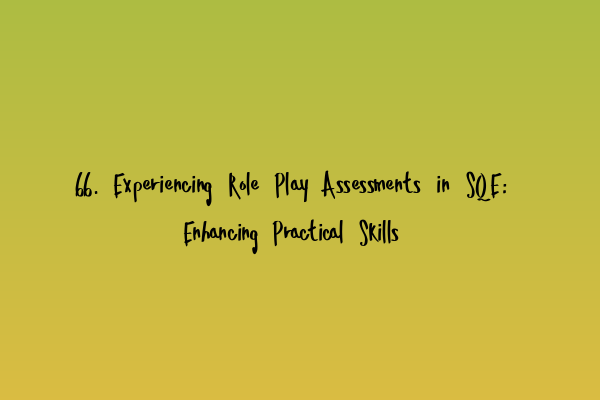66. Experiencing Role Play Assessments in SQE: Enhancing Practical Skills
The Solicitors Qualifying Exam (SQE) is a comprehensive examination designed to assess the practical legal skills of aspiring solicitors. One key component of the SQE is the role play assessments, which provide candidates with an opportunity to showcase their ability to apply legal knowledge in real-life scenarios. In this blog post, we will explore the importance of role play assessments in the SQE and how they enhance practical skills.
Role play assessments in the SQE are designed to simulate real-life legal situations that solicitors often encounter in their practice. Candidates are tasked with playing the role of a solicitor or a client and are provided with a scenario, which can range from a client consultation to a negotiation or advocacy exercise. These assessments require candidates to demonstrate their understanding of the law, their ability to apply legal principles to practical situations, and their professional skills such as communication and problem-solving.
There are several reasons why experiencing role play assessments in the SQE is crucial for enhancing practical skills:
1. Realistic Simulation
The role play assessments in the SQE aim to create a realistic simulation of the legal practice. By engaging in these assessments, candidates get a taste of what it feels like to be a solicitor in the real world. They are exposed to the complexities, challenges, and unpredictability of legal scenarios, which helps them develop their problem-solving skills and adaptability. The experience gained through these simulations prepares candidates for the real-life challenges they will face as solicitors.
2. Application of Legal Knowledge
Role play assessments provide candidates with an opportunity to apply their legal knowledge in practical settings. In the traditional examination format, candidates often struggle with bridging the gap between theory and practice. However, the role play assessments require candidates to demonstrate their ability to apply legal principles to specific situations. This helps candidates develop a deeper understanding of the law and its practical implications.
3. Communication Skills
Effective communication is a fundamental skill for solicitors. Role play assessments in the SQE enable candidates to practice and develop their communication skills in a simulated client-solicitor interaction. Candidates must effectively convey legal advice, actively listen to client concerns, and handle difficult conversations. This hands-on experience enhances candidates’ ability to communicate clearly, concisely, and professionally.
4. Problem-Solving Abilities
Legal practice often involves complex problems that require creative and critical thinking. Role play assessments in the SQE challenge candidates to grapple with legal issues, identify key problems, and find practical solutions. Candidates must analyze the given scenario, evaluate the available options, and make informed decisions. These assessments help candidates develop their problem-solving abilities, fostering their ability to think on their feet and make sound judgments.
Experiencing role play assessments in the SQE is a valuable opportunity for aspiring solicitors to enhance their practical skills and prepare for the demands of legal practice. By engaging in these assessments, candidates can simulate real-life scenarios, apply their legal knowledge, develop their communication skills, and sharpen their problem-solving abilities, all of which are essential for a successful career as a solicitor.
If you are preparing for the SQE, be sure to check out our related articles:
